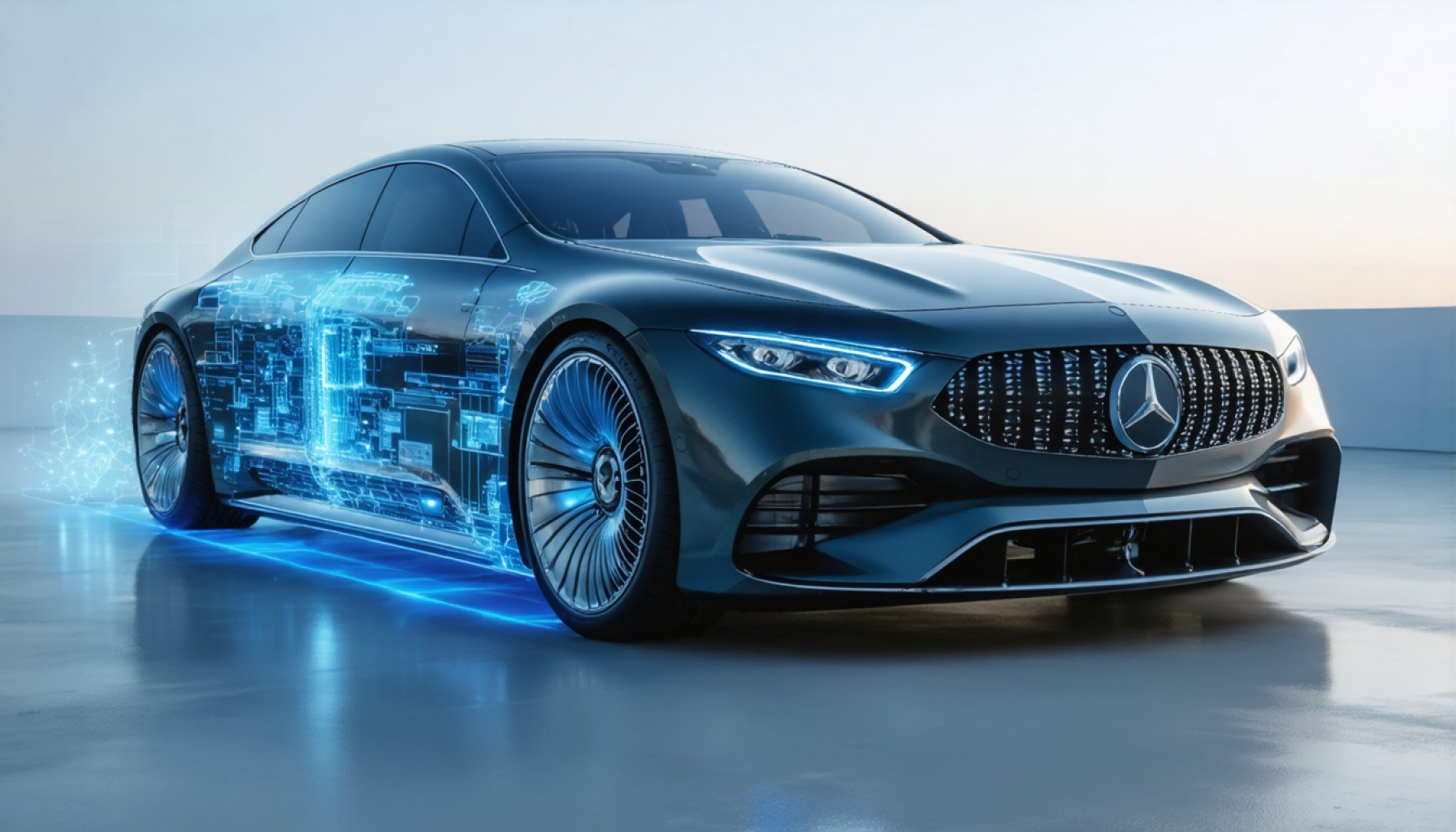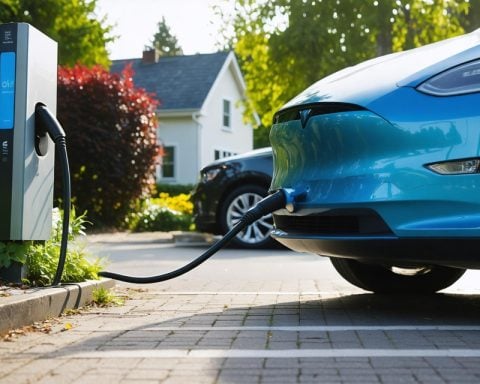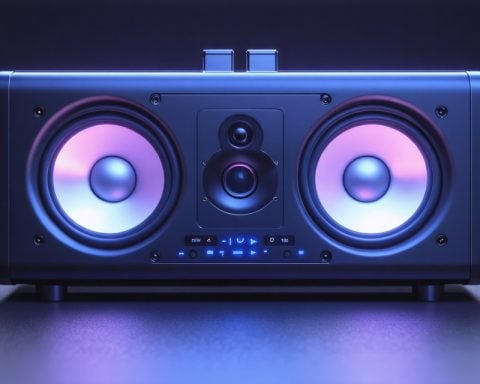- Mercedes-Benz partners with Factorial Energy to develop solid-state batteries, aiming for an electrified automobile future.
- The Solstice battery features FEST technology with a sulfide-based solid electrolyte, ensuring enhanced safety and efficiency.
- Solid-state batteries offer an impressive range, potentially exceeding 600 miles on a single charge, significantly boosting electric vehicle performance.
- Factorial’s solid-state technology achieves a breakthrough energy density of 450 Wh/kg, promising up to 80% more range than lithium-ion batteries.
- Mercedes’ EQS prototype could see its range increase from 511 miles to 620 miles, revolutionizing long-distance travel.
- Global competition intensifies with automotive giants like Hyundai, Honda, and Stellantis exploring solid-state battery innovations.
- Mercedes’ strategic move, led by CTO Markus Shafer, signals a transformative era for electric vehicles in terms of range and efficiency.
Gliding through bustling streets in the UK, Mercedes-Benz vehicles are on the move with a game-changing twist—solid-state batteries. Collaborating with US-based innovator Factorial Energy, Mercedes races toward an electrified future, promising waves of change across the automobile landscape.
Under the hood of these cutting-edge cars lies the Solstice battery, engineered with Factorial’s proprietary FEST technology. This sleek marvel comes with a sulfide-based solid electrolyte that ramps up safety and efficiency, offering a dazzling glimpse into what’s next for electric vehicles. It’s not just about being faster or more powerful—these batteries hint at an astonishing future where a single charge propels vehicles over 600 miles, turning road trips into seamless adventures.
Factorial’s energy-dense power packs redefine possibilities, boasting a 450 Wh/kg “breakthrough” that stands to enhance driving range by 80% over today’s lithium-ion counterparts. Imagine an EQS prototype racing down the highway with about 25% more range, taking its current rating from 511 miles to a surreal 620 miles without missing a beat. Motorists can envision the freedom of extended journeys, transforming how we think about travel.
The allure of solid-state batteries has spurred a global race with automotive giants Hyundai, Honda, and Stellantis, all striving for a slice of this innovative pie. Mercedes’ commitment, shepherded by CTO Markus Shafer, sets the stage for an electrifying leap forward, heralding a new era of range, performance, and efficiency.
Who will prevail in this high-stakes quest is anyone’s guess. What’s clear is that the ticking clock towards mass production paints a thrilling panorama, where the only limit is how far these vehicles can take us.
Unveiling the Future: How Solid-State Batteries Will Revolutionize Your Commute
How Solid-State Batteries Could Transform the Automotive Industry
With Mercedes-Benz spearheading the shift to solid-state batteries, a new era in automotive technology is emerging. Solid-state batteries, designed in collaboration with Factorial Energy, promise to redefine how we view electric vehicles (EVs) and travel. The Solstice battery’s integration of a sulfide-based solid electrolyte marks a technological leap that leads to better safety and efficiency, offering a fresh perspective on EV capabilities.
Key Features and Advantages
1. Increased Energy Density: The Factorial FEST technology can achieve a remarkable 450 Wh/kg energy density, significantly enhancing the battery’s driving range. This breakthrough could translate to up to an 80% increase in driving range compared to current lithium-ion batteries.
2. Longevity and Efficiency: Solid-state batteries may boast a longer life cycle, higher efficiency rates, and reduced charge times, making them more sustainable than traditional batteries.
3. Enhanced Safety: The use of a solid electrolyte reduces flammability, a common risk in liquid electrolyte batteries, paving the way for safer EVs.
Real-World Use Cases
– Extended Journeys: With potential for over 600 miles on a single charge, solid-state batteries can revolutionize road trips, reducing the frequency of charging stops and enhancing overall convenience.
– Integration in Diverse Markets: While Mercedes-Benz is a pioneer, other automotive giants like Hyundai, Honda, and Stellantis are also investing heavily, indicating a widespread application across different markets.
Market Forecasts & Industry Trends
The global solid-state battery market is forecasted to significantly expand by 2028, driven by the increasing adoption of EVs and the need for more efficient battery technologies. Industry analysts predict a compound annual growth rate (CAGR) of over 36% in the coming years, as car manufacturers accelerate research and development in this arena.
Reviews & Comparisons
Early reviews in prototype testing phases suggest that solid-state batteries offer markedly improved safety and performance metrics over lithium-ion models. Comparisons highlight that traditional EVs could lag behind in terms of range and efficiency until solid-state technology becomes widespread.
Controversies & Limitations
Despite the promising outlook, solid-state batteries face significant challenges:
– Production Costs: Manufacturing these batteries at scale remains expensive, which could initially drive up the cost of vehicles equipped with this technology.
– Technical Hurdles: Issues such as dendrite formation and solid-electrolyte interface management need effective solutions before mass production becomes feasible.
Security & Sustainability
Solid-state technology holds potential for increased sustainability due to their longer life spans and reduced reliance on rare materials. This development could eventually lead to a lower environmental footprint from battery disposal and recycling.
Insights & Predictions
As solid-state batteries become more practical and affordable, we can expect:
– Proliferation in High-End Models: Initial application in premium EVs before widespread adoption across mid-range or economy vehicles.
– Impact on Charging Infrastructure: A transformation in charging station distribution and operations due to reduced charging frequency needs.
Actionable Recommendations for Readers
– Stay Informed: Keep up with automotive industry updates to understand when solid-state technology will reach consumer markets.
– Consider Future-Proofing: If purchasing an EV, inquire about potential upgrades or trade-in options for future models featuring solid-state batteries.
– Evaluate Prioritization: Assess which features (range, cost-saving, sustainability) matter most to your driving habits and future-proof plans.
For further insights into EV technology and advancements, visit the Mercedes-Benz website. Stay tuned to industry announcements and white papers to ensure you are well-informed about upcoming releases and innovations.














